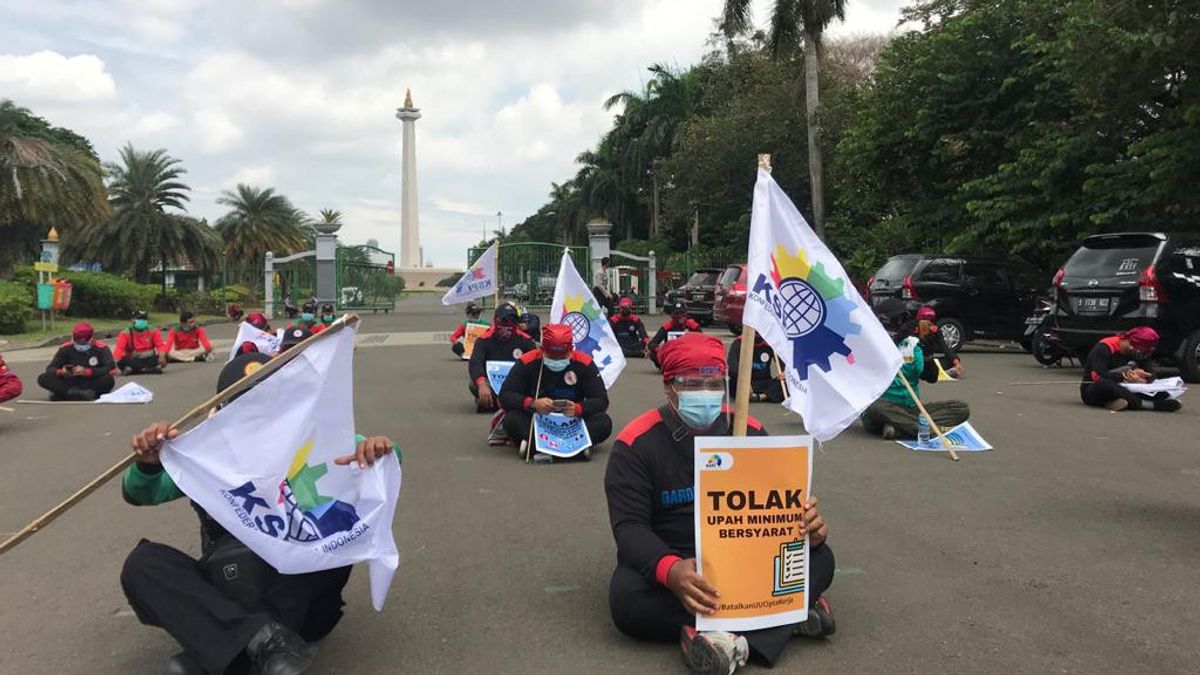JAKARTA - A number of workers who are members of the Confederation of Indonesian Workers Unions (KSPI) again held an action against Law Number 11 of 2020 concerning Job Creation.
The action started around 10.00 WIB. You can see the workers carrying black coffins, and some of them paint their bodies.
In the demonstration that was held at the Silang Monas Barat Daya, Central Jakarta, not many workers took part in the action. Secretary General of FSPMI, Riden Hayam Aziz, said that his party had deliberately reduced the number of people not as many as usual.
This is because they must comply with health protocols during the COVID-19 pandemic. Then, other workers also participated in the Omnibue Law rejection action virtually on social media.
"Today we, from the KSPI, are taking virtual and field actions in order to continue to voice to the government and the DPR RI regarding the passing of the Omnibus Law," said Riden at the location, Tuesday, December 29.
According to Riden, demands for the government and the DPR to revoke the Omnibus Law are still being carried out in two ways, namely the continuation of the action and the submission of a judicial review (JR) in the Constitutional Court.
"Our attitude will never be silent. It will never stop as long as this Omnibus Law has not been canceled. We ask President Jokowi to please withdraw the Job Creation Law for the benefit of workers," said Riden.
For information, there are four crucial issues that are detrimental to workers in the Job Creation Law. KSPI President Said Iqbal mentioned the issue starting with the minimum wage, regarding the status of employee contracts, job loss guarantees, and reduction of severance pay.
 Abolition of minimum wages
Abolition of minimum wagesThe government said that the UMP, UMK, and UMSP were not deleted. Said Iqbal confirmed that the minimum wage was not abolished. However, based on the copy of the draft held by KSPI, the Job Creation Law only regulates the matter of the provincial minimum wage (UMP) and the conditional regency / city minimum wage (UMK).
In the Job Creation Law, it is written that the governor is obliged to set the provincial minimum wage. The governor can also set the district / city minimum wage with certain conditions.
This is different from Law Number 3 of 2003 concerning Manpower which also regulates the District / City Sectoral Minimum Wage (UMSK). This "conditional" phrase is the basis for the resistance of the workers.
"If you say there is still a UMK, what kind of UMK? What workers reject are the words 'conditional'. We don't know that. In other words, we ask to return it to the Manpower Law," said Said Iqbal some time ago.
Lifetime contract employeeSaid Iqbal refuted the narrative that an employee's potential can be made into a life-long contract is untrue. The potential is still there.
In the Manpower Act, the work contract limit is set in several years. If the job is considered good, then the worker must be appointed as a permanent employee or an indefinite work agreement (PKWTT). Meanwhile, in the Job Creation Law, the time limit is not regulated.
"What is meant by fellow workers is that there is a potential for permanent employee disappearance because there is no deadline for the contract. As a result, there is no permanent employee appointment. The government should not explain in half," he explained.

The government's argument is that job loss guarantees (JKP) can be obtained for a work period of 1 year. According to Said Iqbal, there is a possibility that this could be circumvented by the company.
"Because there is no time limit for the contract, the company can make a 6 month or 11 month contract, then break the contract, the important thing is not up to 1 year. That means the company does not need to pay JKP," he said.
Reduced severance payThe government says that the severance pay is not removed, only reduced. In the Manpower Law, the severance pay scheme is 32 months of wages, then in the Job Creation Law it is changed to 25 months of wages, with details of 19 months of wages being paid by the employer, and 6 months of being paid by the government BPJS Ketenagakerjaan.
Iqbal estimates that BPJS will not be able to finance the 6 month severance pay scheme. Because, according to him, BPJS is currently experiencing a deficit. When there is a deficit, the government takes a solution to increase the BPJS contribution.
"When the BPJS contribution is increased, of course the workers will refuse. How come workers pay severance pay for themselves? So, return the severance pay scheme as in the Manpower Law, don't erase it," he added.
The English, Chinese, Japanese, Arabic, and French versions are automatically generated by the AI. So there may still be inaccuracies in translating, please always see Indonesian as our main language. (system supported by DigitalSiber.id)













